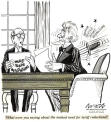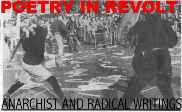The Freeman, a journal of the
Foundation for Economic Education
![]() Published in the
January 2002
issues of
Published in the
January 2002
issues of
The Freeman, a journal of the
Foundation for Economic Education
Quite possibly the most salient feature of e-mail is simply the way it moved junk mail from my outdoor mailbox to my desktop computer. But among the more intriguing examples to come in over the transom of late (having been forwarded and reforwarded almost a dozen times, the result being that by now half the country has probably received it) was this parable for our times:
Despite the obvious intent of both the author and the sender, my initial reaction was: What a great place America is to be unemployed! Like Joe Smith would really be better off in that sweatshop in Singapore? What did give me pause was the identity of the sender -- a man I knew to be a reader of the present journal. However, I also knew that he was an admirer of conservative pundit Patrick Buchanan, author of The Great Betrayal, one of the most popular protectionist tracts of the past few years. I guess it's pretty clear on which side of the fence my acquaintance fell. Since I found this so multiply fallacious, I was beginning to worry that I'd have to reply to the gentleman with a small thesis. Then I realized that the format the author used to express his view should be the same I use to express mine. I came up with this:

|
It makes the point, at least to anyone who isn't determined to miss it. 2 However, I didn't e-mail this to the gentleman (not to mention all the other forwarders) for fear that one man's reductio ad absurdum might become another man's logical conclusion. Could someone now think that "economic nationalism" is just as bad as globalism, that trade must be forced down even further to the state -- to the local -- level?
But isn't there a conflict between "community and self-reliance" -- i.e., between the interdependence of a community and
the independence of oneself?
I've also recently discovered the answer to that question.
As part of a feature on "anarchism," the May-June
Utne Reader
I think that at base a person is not complete or
free insofar as that person's life and the whole
surrounding setup depend on his or her being just some
aspect of a process, some fraction of it. A divided
life mirrors the basic divisions in society and it all
starts there.
Recognizing the implications of this rhetoric, the interviewer
asks another logical question:
But humans are social animals.
Isn't it necessary for us to rely on each other?
Division of
labor, it seems, creates only "a form of dependence that comes
from relying on others who have specialized skills you don't
have. They now have power over you. Whether they are 'benevolent'
in using it is really beside the point."
7
Mr. Zerzan then
translates theory into practice with a statement I really must
quote in full:
Theory and history demonstrate that at one pole of the
opposition to free enterprise looms the total domination of
society by the State; at the other, the total
obliteration
of
society as such.
The only way to avoid being drawn into this madness is to
not go anywhere near it to begin with.
That means
responding to
the first rumblings of protectionism with
a resolute affirmation
of the right of all parties to engage in the peaceful exchange of
goods and ideas -- be it across the street, the border or the
ocean.
These essays appear on the web at:
http://abcdunlimited.com/ideas/
 I've recently discovered that that's not an open question.
For the Institute for Local Self-Reliance, the threat that
multinational corporations pose to American "sovereignty" is
paralleled by the threat that chain stores pose to "locally owned
businesses."
3
"Devolution" of commerce to the "community" level
I've recently discovered that that's not an open question.
For the Institute for Local Self-Reliance, the threat that
multinational corporations pose to American "sovereignty" is
paralleled by the threat that chain stores pose to "locally owned
businesses."
3
"Devolution" of commerce to the "community" level
 becomes an end that justifies every means from "local zoning
ordinances to federal antitrust policy." Among the specifics are
ATM surcharge bans, market share caps, a financial transactions
tax (proposed by Keynes in 1930!) on foreign
and
domestic trade,
an Internet sales tax, "cultural protection laws" ("to encourage
local creation -- such as films -- that might otherwise disappear
in the face of Hollywood's hunger for global markets"), an
outright prohibition of corporate ownership and protection for
small farmers (e.g., an anti- "price discrimination" law, which
would disallow a buyer to offer a higher price for a larger
order, since that constitutes "discrimination" against smaller
producers).
4
becomes an end that justifies every means from "local zoning
ordinances to federal antitrust policy." Among the specifics are
ATM surcharge bans, market share caps, a financial transactions
tax (proposed by Keynes in 1930!) on foreign
and
domestic trade,
an Internet sales tax, "cultural protection laws" ("to encourage
local creation -- such as films -- that might otherwise disappear
in the face of Hollywood's hunger for global markets"), an
outright prohibition of corporate ownership and protection for
small farmers (e.g., an anti- "price discrimination" law, which
would disallow a buyer to offer a higher price for a larger
order, since that constitutes "discrimination" against smaller
producers).
4
 In Free Trade: The Great Destroyer, David Morris,
the Institute's director, reveals the vision inspiring these
proposals:
In Free Trade: The Great Destroyer, David Morris,
the Institute's director, reveals the vision inspiring these
proposals:
 presented an interview with "[s]elf-described neo-Luddite
John Zerzan[, an] anarchist writer and researcher."
Contrary to any
Rothbardian connotations,
Mr. Zerzan defines anarchism as
opposition to "all forms of domination[, which] includes not only
such obvious forms as the nation-state... [but] the whole van of
civilization -- armies, religion, law, the state... [and even the
dawn of] art, and on the heels of that, agriculture."
6
presented an interview with "[s]elf-described neo-Luddite
John Zerzan[, an] anarchist writer and researcher."
Contrary to any
Rothbardian connotations,
Mr. Zerzan defines anarchism as
opposition to "all forms of domination[, which] includes not only
such obvious forms as the nation-state... [but] the whole van of
civilization -- armies, religion, law, the state... [and even the
dawn of] art, and on the heels of that, agriculture."
6
 Mr. Zerzan
informs us that "life before agriculture and domestication -- in
which by domesticating others [i.e., animals] we domesticated
ourselves -- was in fact largely one of leisure, intimacy with
nature, sensual wisdom, sexual equality, and health." Our fall
from grace occurred "because for many millennia there was a kind
of slow slippage into division of labor." The interviewer asks
the logical question:
What's wrong with division of labor?
And he
responds:
Mr. Zerzan
informs us that "life before agriculture and domestication -- in
which by domesticating others [i.e., animals] we domesticated
ourselves -- was in fact largely one of leisure, intimacy with
nature, sensual wisdom, sexual equality, and health." Our fall
from grace occurred "because for many millennia there was a kind
of slow slippage into division of labor." The interviewer asks
the logical question:
What's wrong with division of labor?
And he
responds:
If your primary goal is mass production, nothing at
all. It's central to our way of life. Each person
performs as a tiny cog in this machine [i.e.,
civilization]. If, on the other hand, your goal is
relative wholeness, egalitarianism, autonomy, or an
intact world, there's quite a lot wrong with it.
In addition to direct control by those who have
specialized skills, there is a lot of mystification of
those skills. Part of the ideology of modern society is
that without it, you'd be completely lost, you wouldn't
know how to do the simplest thing. Well, humans have
been feeding themselves for the past couple of million
years, and doing it a lot more successfully and
efficiently than we do now. The global food system is
insane. It's amazingly inhumane and inefficient. We
waste the world with pesticides, herbicides, the
effects of fossil fuels to transport and store foods,
and so on, and literally millions of people go their
entire lives without ever having enough to eat. But few
things are simpler than growing or gathering your own
food.
8
What began with tariffs on imports, ends with each man picking
his own berries for food. We have pursued this premise around and

 down to its nadir. Now, division of labor is not a global,
national or even local evil, but an
intrinsic one.
The inequity
of the "power" that the capitalist has over the workers by owning
the means of production is eclipsed by the inequity of the
"power" that Peter has over Paul simply by being able to do
something he can't.
9
down to its nadir. Now, division of labor is not a global,
national or even local evil, but an
intrinsic one.
The inequity
of the "power" that the capitalist has over the workers by owning
the means of production is eclipsed by the inequity of the
"power" that Peter has over Paul simply by being able to do
something he can't.
9

Notes-
Barry Loberfeld
 Trinity Farms International
is at
trinityfarms@trinityfarms.org
Trinity Farms International
is at
trinityfarms@trinityfarms.org

The single greatest factor leading to the
deindustrialization of America has been capital
mobility across national lines. But a second problem,
almost as serious, is capital mobility within the
country.
The goal of our economics, an economics for
community, is to restore to communities the power to
determine their own affairs. That requires a
regionalization of economic power and activity that
would attach capital to regions. This would be a deep
reversal of recent trends.
Herman Daly and John Cobb Jr., New Options, December 26, 1989.
They expand upon this theme in For the Common Good: Redirecting
the Economy Toward Community, the Environment, and a Sustainable
Future, 1994.



 barry @ abcdunlimited . c o m
barry @ abcdunlimited . c o m
![]() Software copyright © 2002 by
Tripodics
Software copyright © 2002 by
Tripodics
Website -- courtesy of
Weþyx
